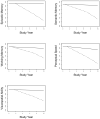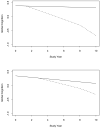Cognitive decline in prodromal Alzheimer disease and mild cognitive impairment
- PMID: 21403020
- PMCID: PMC3100533
- DOI: 10.1001/archneurol.2011.31
Cognitive decline in prodromal Alzheimer disease and mild cognitive impairment
Abstract
Objective: To characterize the course of cognitive decline during the prodromal phase of Alzheimer disease.
Design: Longitudinal cohort study with up to 16 years of observation.
Participants: Older persons from 2 studies underwent annual clinical evaluations that included cognitive function testing and clinical classification of mild cognitive impairment, dementia, and Alzheimer disease. At baseline, there were 2071 individuals without dementia and 1511 without cognitive impairment.
Results: During follow-up, 462 persons developed Alzheimer disease (20 with dementia solely due to another condition were excluded). Five to six years before diagnosis, the rate of global cognitive decline accelerated more than 15-fold. The acceleration in cognitive decline occurred slightly earlier for semantic memory (76 months before diagnosis) and working memory (75 months) than other cognitive functions. Mild cognitive impairment was also preceded by years of cognitive decline that began earlier (80 months before diagnosis) and proceeded more rapidly (annual loss of 0.102 unit) in the amnestic than in the nonamnestic (62 months, 0.072 unit) subtype.
Conclusion: Dementia due to Alzheimer disease is preceded by about 5 to 6 years of accelerated decline in multiple cognitive functions. By contrast, little decline is evident in persons who do not develop Alzheimer disease.
Figures



References
-
- Sloane PD, Zimmerman S, Suchindran C, Reed P, Wang L, Boustani M, Sudha S. The public health impact of Alzheimer's disease, 2000-2050: potential implication of treatment advances. Ann Rev Pub Health. 2002;23:213–231. - PubMed
-
- Hall CB, Lipton RB, Sliwinski M, Stewart WF. A change point model for estimating the onset of cognitive decline in preclinical Alzheimer's disease. Stat Med. 2000;19:1555–1566. - PubMed
-
- Amieva H, Jacqmin-Gadda H, Orgogozo JM, et al. The 9 year cognitive decline before dementia of Alzheimer type: a prospective population-based study. Brain. 2005;128:1093–1101. - PubMed
-
- Amieva H, LeGaff M, Millet X, et al. Prodromal Alzheimer's disease: successive emergence of clinical symptoms. Ann Neurol. 2008;64:492–498. - PubMed
Publication types
MeSH terms
Grants and funding
LinkOut - more resources
Full Text Sources
Medical

